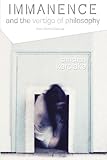Immanence and the Vertigo of Philosophy : From Kant to Deleuze / Christian Kerslake.
Material type: TextSeries: Plateaus - New Directions in Deleuze Studies : PLATPublisher: Edinburgh : Edinburgh University Press, [2022]Copyright date: ©2009Description: 1 online resource (334 p.)Content type:
TextSeries: Plateaus - New Directions in Deleuze Studies : PLATPublisher: Edinburgh : Edinburgh University Press, [2022]Copyright date: ©2009Description: 1 online resource (334 p.)Content type: - 9780748635900
- 9781474469807
- 146.44 22
- online - DeGruyter
| Item type | Current library | Call number | URL | Status | Notes | Barcode | |
|---|---|---|---|---|---|---|---|
 eBook
eBook
|
Biblioteca "Angelicum" Pont. Univ. S.Tommaso d'Aquino Nuvola online | online - DeGruyter (Browse shelf(Opens below)) | Online access | Not for loan (Accesso limitato) | Accesso per gli utenti autorizzati / Access for authorized users | (dgr)9781474469807 |
Frontmatter -- Contents -- Note on the Text and Acknowledgements -- Note on Sources and Abbreviations -- Introduction: The Problem of Immanence – Kant, Hegel and Spinozism -- Chapter One: Critique and the Ends of Reason -- Chapter Two: The Metaphysical Origins of Kantianism -- Chapter Three: Kant and the Structure of Cognition -- Chapter Four: Deleuze and the Vertigo of Immanence -- Appendix: Francis Warrain’s Diagram of Wronski’s Law of Creation -- Bibliography -- Index
restricted access online access with authorization star
http://purl.org/coar/access_right/c_16ec
GBS_insertPreviewButtonPopup('ISBN:9780748635900);One of the terminological constants in the philosophical work of Gilles Deleuze is the word 'immanence', and it has therefore become a foothold for those wishing to understand exactly what 'Deleuzian philosophy' is. Deleuze's philosophy of immanence is held to be fundamentally characterised by its opposition to all philosophies of 'transcendence'. On that basis, it is widely believed that Deleuze's project is premised on a return to a materialist metaphysics. Christian Kerslake argues that such an interpretation is fundamentally misconceived, and has led to misunderstandings of Deleuze's philosophy, which is rather one of the latest heirs to the post-Kantian tradition of thought about immanence. This will be the first book to assess Deleuze's relationship to Kantian epistemology and post-Kantian philosophy, and will attempt to make Deleuze's philosophy intelligible to students working within that tradition. But it also attempts to reconstruct our image of the post-Kantian tradition, isolating a lineage that takes shape in the work of Schelling and Wronski, and which is developed in the twentieth century by Bergson, Warrain and Deleuze."
Mode of access: Internet via World Wide Web.
In English.
Description based on online resource; title from PDF title page (publisher's Web site, viewed 29. Jun 2022)


